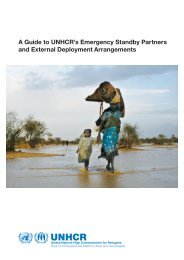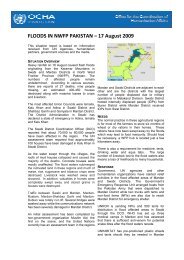Advocacy and resource mobilisation - OneResponse
Advocacy and resource mobilisation - OneResponse
Advocacy and resource mobilisation - OneResponse
Create successful ePaper yourself
Turn your PDF publications into a flip-book with our unique Google optimized e-Paper software.
<strong>Advocacy</strong> <strong>and</strong> <strong>resource</strong> <strong>mobilisation</strong><br />
� the priority that communities give to education<br />
� the role of education in providing protection.<br />
<strong>Advocacy</strong> is a strategic way of getting these arguments across. The importance of<br />
education in emergencies is well documented in a range of international<br />
principles <strong>and</strong> guiding frameworks. These are set out in detail in section 3.1.1.<br />
Specific guidance on advocating for <strong>and</strong> promoting education in emergencies is<br />
offered by the Inter-agency Network for Education in Emergencies (INEE)<br />
through a range of tools <strong>and</strong> <strong>resource</strong>s:<br />
http://www.ineesite.org/index.php/post/promotion_advocacy/<br />
A number of additional advocacy <strong>resource</strong>s <strong>and</strong> guidelines are included in the<br />
‘Additional <strong>resource</strong>s’ listed at the end of this section.<br />
The right to education<br />
� Education is a right –This right<br />
is articulated in various<br />
international humanitarian <strong>and</strong><br />
human rights instruments,<br />
including the Geneva<br />
Conventions, which apply in<br />
times of war, as well as the UN<br />
Convention on the Rights of the<br />
Child 1989, the Universal<br />
Declaration of Human Rights <strong>and</strong><br />
many regional human rights<br />
instruments. Education is also an<br />
integral part of the right to a life<br />
with dignity as embodied in the<br />
Sphere Project Humanitarian<br />
Charter.<br />
A Sudanese refugee in Chad,<br />
describing the vital importance of<br />
education to refugees in crisis<br />
situations, said: “In this war, our cattle<br />
has been taken by the Janjaweed <strong>and</strong><br />
we had to flee our l<strong>and</strong>. We had to<br />
leave behind all of our possessions.<br />
The only thing we could bring with us<br />
is what we have in our heads, what we<br />
have been taught – our education.<br />
Education is the only thing that cannot<br />
be taken from us <strong>and</strong> upon which we<br />
can build a better life for our children.”<br />
Extract from INEE, Talking Points:<br />
Education in Emergencies, p. 2<br />
� Education is essential to child <strong>and</strong> adult development – Education<br />
equips people with the life skills <strong>and</strong> knowledge that enable them to play an<br />
active role in the community, <strong>and</strong> as adults, gain access to greater social <strong>and</strong><br />
economic opportunities. In emergencies, increased assistance <strong>and</strong> innovative<br />
programmes offer opportunities to build back better education systems <strong>and</strong><br />
improve the quality of <strong>and</strong> access to education.<br />
The priority that communities give to education<br />
� Education is a priority – Education is prioritised by communities <strong>and</strong> offers<br />
a lifeline to them. Communities often start up some kind of education or<br />
school themselves during an emergency. However, maintaining this during a<br />
crisis is difficult when there is less local capacity <strong>and</strong> <strong>resource</strong>s.<br />
� Education is a platform for community outreach – Schools can also<br />
provide a platform for other types of community-level intervention on, for<br />
May 2010 | 247











